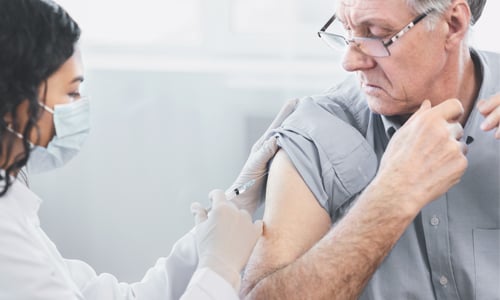The new variant of coronavirus, Omicron, was only first identified on 24 November, but things are changing fast and numbers of infections are now increasing quickly. What do we need to know, and what should we think about?
The three big questions about Omicron
1. How ill does Omicron make you?
There has been lots of discussion about whether Omicron is milder than other variants of coronavirus. There isn’t reliable evidence of this, and because it takes time for people to get seriously unwell after they’re infected we won’t have evidence on this for a few weeks yet. It’s therefore best to be cautious and not assume that Omicron is milder than previous variants.
2. How easy is Omicron to catch?
We’ve heard a lot about Omicron spreading more easily than other coronavirus variants. There is now reliable evidence that this is the case, and Omicron is spreading very quickly in many parts of the UK. What is difficult to know is whether that’s because there’s something special about Omicron that makes it easier to catch and pass on, or whether it’s something to do with how well the vaccines work against it.
3. Does the immunity we have protect against Omicron?
Omicron originally got the attention of scientists because it has a very large number of mutations – more than any previous coronavirus variant we’ve seen. And many of these mutations are on the spike protein that the virus uses to get into our cells to infect us. The spike protein is also the part of the virus that our immune systems learn to recognise, when we catch coronavirus or get vaccinated. This means that mutations to the spike protein are a good reason to be concerned that any immunity we have may work less well.
There’s now emerging real world evidence that it is easier for people to catch Omicron than the previously most common variant, Delta, even if they’ve been vaccinated or have had coronavirus before. However, a vaccinated person is still more protected than an unvaccinated person, and a person who has had a booster vaccination is more protected still. Importantly, scientists are hopeful that vaccination might provide important protection against serious illness from Omicron, even if we catch it.
So, what should I do?
The Government has responded to the rapid spread of Omicron by reintroducing some public health measures to control it’s spread. For all the information about this, visit our information and Advice section. But is there more we should be doing?
Get vaccinated
Anyone who has not yet been vaccinated should seriously consider doing so. Vaccination is very safe – much safer than catching coronavirus – and it provides protection against catching all variants of coronavirus, and most importantly provides excellent protection against becoming seriously unwell.
Get boosted
Once 3 months have passed since your second vaccination, everyone aged over 18 is eligible for a booster vaccination. This provides a really important reminder to your immune system, and substantially increases the protection you have against catching coronavirus and becoming seriously unwell.
Consider your social contacts
You may have heard that the Chief Medical Officer, Chris Whitty, has suggested that people should be thinking carefully about their social contacts, and making sure they prioritise those that are most important to them. This is sensible advice. It’s also a good idea think about whether it’s possible to meet outside, and if not, to make sure rooms aren’t too crowded and are well ventilated. You may also want to consider doing a lateral flow test (LFT) before you meet up with people, and suggesting they do the same. If you do, make sure you do it immediately before you meet up, for the most accurate information on whether you’re infectious.
Dr Elizabeth Webb is Head of Research at Age UK. She has an MSc in Epidemiology from the London School of Hygiene and Tropical Medicine and a PhD in Social Epidemiology from University College London.





